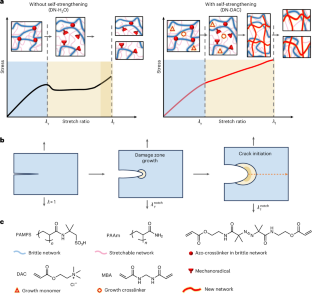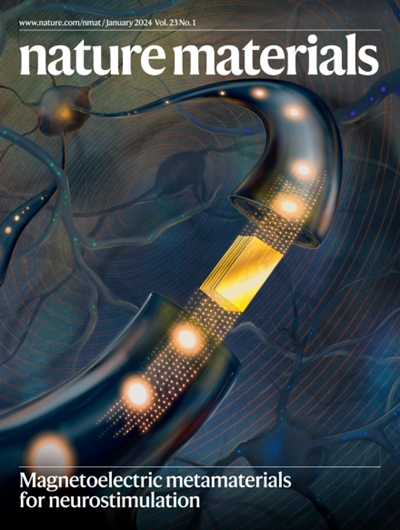Rapid self-strengthening in double-network hydrogels triggered by bond scission
IF 38.5
1区 材料科学
Q1 CHEMISTRY, PHYSICAL
引用次数: 0
Abstract
The scission of chemical bonds in materials can lead to catastrophic failure, with weak bonds typically undermining the materials’ strength. Here we demonstrate how weak bonds can be leveraged to achieve self-strengthening in polymer network materials. These weak sacrificial bonds trigger mechanochemical reactions, forming new networks rapidly enough to reinforce the material during deformation and significantly improve crack resistance. This rapid strengthening exhibits strong rate dependence, dictated by the interplay between bond breaking and the kinetics of force-induced network formation. As the network formation is generally applicable to diverse monomers and crosslinkers with different kinetics, a wide range of mechanical properties can be obtained. These findings may inspire the design of tough polymer materials with on-demand, rate-dependent mechanical behaviours through mechanochemistry, broadening their applications across various fields. Weak bonds enable self-strengthening in polymers by triggering mechanochemical reactions during deformation, forming new networks that enhance strength and crack resistance. This rate-dependent process allows custom design of tough polymers.


键断裂引发的双网水凝胶的快速自强化
材料中化学键的断裂会导致灾难性的破坏,弱化学键通常会破坏材料的强度。在这里,我们展示了如何利用弱键来实现聚合物网络材料的自我强化。这些弱牺牲键触发机械化学反应,迅速形成新的网络,在变形过程中增强材料,显著提高抗裂性。这种快速强化表现出强烈的速率依赖性,这是由键断裂和力诱导的网络形成动力学之间的相互作用决定的。由于网络的形成一般适用于具有不同动力学的各种单体和交联剂,因此可以获得广泛的力学性能。这些发现可能会启发人们通过机械化学设计出具有按需、速率依赖的机械行为的坚韧聚合物材料,从而扩大其在各个领域的应用。
本文章由计算机程序翻译,如有差异,请以英文原文为准。
求助全文
约1分钟内获得全文
求助全文
来源期刊

Nature Materials
工程技术-材料科学:综合
CiteScore
62.20
自引率
0.70%
发文量
221
审稿时长
3.2 months
期刊介绍:
Nature Materials is a monthly multi-disciplinary journal aimed at bringing together cutting-edge research across the entire spectrum of materials science and engineering. It covers all applied and fundamental aspects of the synthesis/processing, structure/composition, properties, and performance of materials. The journal recognizes that materials research has an increasing impact on classical disciplines such as physics, chemistry, and biology.
Additionally, Nature Materials provides a forum for the development of a common identity among materials scientists and encourages interdisciplinary collaboration. It takes an integrated and balanced approach to all areas of materials research, fostering the exchange of ideas between scientists involved in different disciplines.
Nature Materials is an invaluable resource for scientists in academia and industry who are active in discovering and developing materials and materials-related concepts. It offers engaging and informative papers of exceptional significance and quality, with the aim of influencing the development of society in the future.
 求助内容:
求助内容: 应助结果提醒方式:
应助结果提醒方式:


